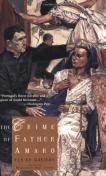BKMT READING GUIDES
The Crime of Father Amaro
by Jose Maria Eca De Queiros, Margaret Jull Costa
Published: 2003-05
Paperback : 480 pages
Paperback : 480 pages
0 members reading this now
1 club reading this now
1 member has read this book
1 club reading this now
1 member has read this book
An unflinching portrait of a priest who seduces his landlady's daughter, made into an acclaimed and controversial motion picture.
Eça de Queirós''s novel The Crime of Father Amaro is a lurid satire of clerical corruption in a town in Portugal (Leira) during the period before and after ...
No other editions available.
Jump to
Introduction
An unflinching portrait of a priest who seduces his landlady's daughter, made into an acclaimed and controversial motion picture.
Eça de Queirós''s novel The Crime of Father Amaro is a lurid satire of clerical corruption in a town in Portugal (Leira) during the period before and after the 1871 Paris Commune. At the start, a priest physically explodes after a fish supper while guests at a birthday celebration are "wildly dancing a polka." Young Father Amaro (whose name means "bitter" in Portuguese) arrives in Leira and soon lusts after?and is lusted after by?budding Amelia, dewy-lipped, devout daughter of Sao Joaneira who has taken in Father Amaro as a lodger. What ensues is a secret love affair amidst a host of compelling minor characters: Canon Dias, glutton and Sao Joaneira's lover; Dona Maria da Assuncao, a wealthy widow with a roomful of religious images, agog at any hint of sex; Joao Eduardo, repressed atheist, free-thinker and suitor to Amelia; Father Brito, "the strongest and most stupid priest in the diocese;" the administrator of the municipal council who spies at a neighbor's wife through binoculars for hours every day. Eça's incisive critique flies like a shattering mirror, jabbing everything from the hypocrisy of a rich and powerful Church, to the provincialism of men and women in Portuguese society of the time, to the ineptness of politics or science as antidotes to the town's ills. What lurks within Eça's narrative is a religion of tolerance, wisdom, and equality nearly forgotten. Margaret Jull Costa has rendered an exquisite translation and provides an informative introduction to a story that truly spans all ages.Discussion Questions
Suggested by Members
If the book was set in modern times, would Amelia abort the baby?
Would Father Amaro encourage her to so?
by [email protected] (see profile) 01/08/17Book Club Recommendations
Recommended to book clubs by 1 of 1 members.
MEMBER LOGIN
BECOME A MEMBER it's free
Now serving over 80,000 book clubs & ready to welcome yours. Join us and get the Top Book Club Picks of 2022 (so far).
SEARCH OUR READING GUIDES
Search
FEATURED EVENTS
PAST AUTHOR CHATS
JOIN OUR MAILING LIST
Get free weekly updates on top club picks, book giveaways, author events and more
Get free weekly updates on top club picks, book giveaways, author events and more
Please wait...








